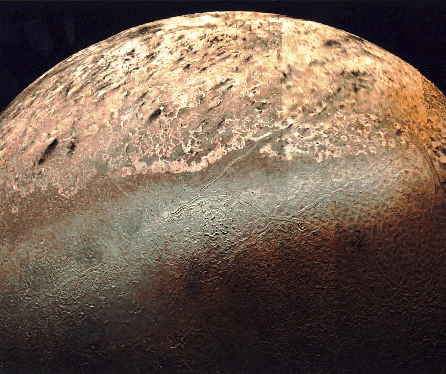Triton: Neptune's Largest Moon

Explanation:
Today marks the 150
th anniversary of the
discovery of Triton. On October 10 1846,
William Lassell
was observing the
newly discovered
planet
Neptune. He was attempting
to confirm his observation, made just the previous week,
that
Neptune
had a ring.
But this time he discovered
that
Neptune
had a satellite as well. Lassell soon proved the ring
was product of his new telescope's distortion, but the satellite
Triton
remained. The above picture of
Triton
was taken in 1989 by the only spacecraft ever to pass
Triton:
Voyager 2.
Voyager 2 found fascinating terrain,
a thin atmosphere, and even evidence for ice volcanoes on this
world of peculiar orbit and spin. Ironically,
Voyager 2 also confirmed the existence of complete thin rings around Neptune
- but these would have been quite invisible to Lassell!
Authors & editors:
Robert Nemiroff
(MTU) &
Jerry Bonnell
(USRA)
NASA Web Site Statements, Warnings,
and Disclaimers
NASA Official: Jay Norris.
Specific
rights apply.
A service of:
LHEA at
NASA /
GSFC
& Michigan Tech. U.

